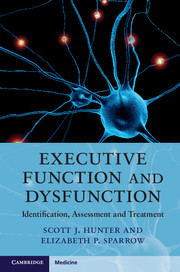Book contents
- Frontmatter
- Contents
- Editor biographies
- List of Contributors
- Preface
- Acknowledgments
- Introduction
- Section I Foundations of Executive Function/Dysfunction
- Section II Executive Dysfunction in the Neurodevelopmental and Acquired Disorders
- Introduction to Section II
- Chapter 5 Executive functions in disruptive behavior disorders
- Chapter 6 Executive functions in autism spectrum disorders
- Chapter 7 Executive functions in intellectual disability syndromes
- Chapter 8 Executive functions in pediatric movement and motor control disorders
- Chapter 9 Executive functions in learning disorders
- Chapter 10 Executive functions in mood and anxiety disorders
- Chapter 11 Executive functions in childhood epilepsy
- Chapter 12 Executive functions in pediatric cancer
- Chapter 13 Executive functions in HIV
- Chapter 14 Executive functions and neurotoxic exposure
- Chapter 15 Executive functions after congenital and prenatal insults
- Chapter 16 Executive functions in acquired brain injury
- Section III Applications
- Appendix 1 Abbreviations used in the book
- Appendix 2 Tests/tasks referenced in the book
- Index
- References
Chapter 10 - Executive functions in mood and anxiety disorders
from Section II - Executive Dysfunction in the Neurodevelopmental and Acquired Disorders
Published online by Cambridge University Press: 05 October 2012
- Frontmatter
- Contents
- Editor biographies
- List of Contributors
- Preface
- Acknowledgments
- Introduction
- Section I Foundations of Executive Function/Dysfunction
- Section II Executive Dysfunction in the Neurodevelopmental and Acquired Disorders
- Introduction to Section II
- Chapter 5 Executive functions in disruptive behavior disorders
- Chapter 6 Executive functions in autism spectrum disorders
- Chapter 7 Executive functions in intellectual disability syndromes
- Chapter 8 Executive functions in pediatric movement and motor control disorders
- Chapter 9 Executive functions in learning disorders
- Chapter 10 Executive functions in mood and anxiety disorders
- Chapter 11 Executive functions in childhood epilepsy
- Chapter 12 Executive functions in pediatric cancer
- Chapter 13 Executive functions in HIV
- Chapter 14 Executive functions and neurotoxic exposure
- Chapter 15 Executive functions after congenital and prenatal insults
- Chapter 16 Executive functions in acquired brain injury
- Section III Applications
- Appendix 1 Abbreviations used in the book
- Appendix 2 Tests/tasks referenced in the book
- Index
- References
Summary
Mood and anxiety disorders in children and adolescents have been widely examined empirically, yet relatively few studies have focused on the effects of these disorders on developing EF skills. This lack of knowledge regarding a core cognitive capacity has hampered efforts at understanding and addressing potential disruptions in problem solving, memory, and engagement that often co-occur with mood and anxiety disorders.
Mood disorders
Mood disorders include diagnoses for which the primary symptoms are a change in emotional state. This category of psychopathology includes significantly elevated or depressed mood, inappropriate affect, or a limited range of feelings, and is diagnostically composed of major depressive disorder (MDD), bipolar disorder (BD), cyclothymic disorder, and dysthymic disorder in the DSM-IV-TR. In the upcoming DSM-5, this group of disorders will likely be divided further into two categories, bipolar and related disorders and depressive disorders. While few changes to the diagnosis of MDD are anticipated, the criteria for BD will likely be developmentally based, and include increased specificity in order to capture the presentation of manic symptoms observed in children. The DSM-5 may include a new disorder, temper dysregulation disorder with dysphoria (TDD), characterized by temper outbursts that begin before 10 years of age, although its inclusion remains both controversial and uncertain.
Information
- Type
- Chapter
- Information
- Executive Function and DysfunctionIdentification, Assessment and Treatment, pp. 141 - 148Publisher: Cambridge University PressPrint publication year: 2012
References
Accessibility standard: Unknown
Why this information is here
This section outlines the accessibility features of this content - including support for screen readers, full keyboard navigation and high-contrast display options. This may not be relevant for you.Accessibility Information
- 3
- Cited by
